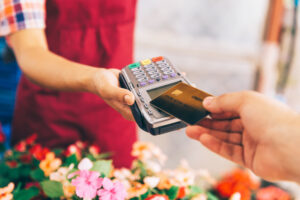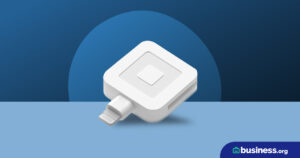💸 See if your business qualifies for a tax credit worth up to $26k per employee. 📞 Call Now: 855-979-9597
Online Payment Security: Top 6 Safety Practices
We are committed to sharing unbiased reviews. Some of the links on our site are from our partners who compensate us. Read our editorial guidelines and advertising disclosure.
Online payment security is all about guarding your businesses and protecting your customers’ personal details. This article details the most important security procedures for handling electronic payments.
Luckily, you may not have to do too much depending on your payment processor—many processing companies shoulder most of the security burden. That said, some processors have fewer security features in place, so it’s crucial to know how to ensure online payment security.
You can ask any current or prospective payment processing provider if it handles the electronic payment processing security protocols described in this article. That way you can dot all your i’s and cross your t’s.
1. PCI Compliance
PCI compliance is the most important security consideration, as not following these protocols could land you in legal trouble. So what does PCI stand for? PCI is short for the Payment Card Industry. This organization is responsible for setting security standards for electronic payment processing.
Any business that processes credit card payments must comply with PCI standards and practices. These standards are detailed in a document called the Payment Card Industry Data Security Standard (PCI DSS). The exact standards your business must follow depends on its size. There are four levels of business classification that the PCI assigns based on the number of transactions a business makes.
- Level 4: Less than 20,000 card transactions per year
- Level 3: Between 20,000 to 1 million card transactions per year
- Level 2: Between 1–6 million card transactions per year
- Level 1: Over 6 million card transactions per year
While all legitimate processing providers are required to offer PCI compliant services, it’s still worth investigating the PCI standards for yourself, as any noncompliance can lead to legal action. Ask your processing provider how your business can uphold its end of the PCI compliance standard.
PCI compliance is complicated if your business handles it alone. Luckily, most processing companies handle credit card processing, transaction history, and credit card detail storage for you.
Certain processing providers like Square, for example, don’t share detailed card and customer information with businesses directly. Because of this, Square takes on most of the PCI burden. That’s why a business can order a free Square reader and immediately start processing cards without much fuss.
The easiest course of action is to find a processor, like Square, that takes the burden of compliance. Most processors do just that, but it's always good to ask.
2. SSL protocol
SSL protocol is something that only affects businesses that sell their wares online. SSL stands for secure sockets layer, a fancy phrase that refers to an internet security encryption protocol. You’ve likely seen examples of SSL without even realizing it.
One way to tell a website is using SSL is to observe whether its URL starts with https. Website URLs that start with https have an SSL certificate. That certificate is essentially proof that the site is using SSL encryption. Another common symbol associated with SSL is the padlock. If a site has a padlock that appears near its URL, it’s SSL certified.
Customers who are aware of SSL like to see https in the URL as well as the padlock, so it’s smart to make sure your website has an SSL certificate. There are few ways to do this:
- Build your website using a builder that offers SSL certification
- Buy SSL certification from a third-party seller
- Use a payment gateway or payment page offered by your processing company
Most processing providers will offer some kind of online payment portal that is SSL certified. It’s only if you’ve built your own website that you’ll have to make sure your site is protected.
By signing up I agree to the Terms of Use and Privacy Policy.
3. Tokenization
Tokenization is an extra layer of security that protects customer payment data. Offered by some payment processors, tokenization happens when a program converts payment data into a random string of numbers.
If a hacker were to gain access to this tokenized data, it would be completely meaningless and useless. That’s what makes tokenization a desirable online payment security feature. If you’re still looking for a payment processor, you should ask if its processor uses tokenization.
It’s always smart to have an extra layer of security.
4. 3D secure
One of the best times to weed out potential security threats is during checkout. 3D secure is a feature that does just that. When a customer goes to pay for a product or service online, 3D secure adds an extra layer of authentication that is administered by the cardholder’s bank.
So, if a customer is using a Visa card to purchase a product on your site, Visa would be the one handling the final authentication test. These tests can include entering pin codes or using biometric scans. You don’t get to decide on the kind of test given because it’s performed by the card-issuing bank.
This extra layer of online payment security helps ensure that the person using the card is the actual person to whom the card was issued. Some, but not all, payment processors offer this security feature.
5. Address verification service
Have you ever had to enter your billing address into a website? That billing address is used to authenticate your credit card. If the billing address you entered matches the one on file with your credit card provider, the transaction will go through.
The address verification service (AVS) is one of the most common online payment security methods. Almost every processor uses it because it’s easy to implement. Though not a foolproof method of preventing fraud, it does significantly reduce the probability of a fraudulent charge going through.
The takeaway
Processing secure online transactions and payments is crucial to avoiding fraudulent payments and data breaches. Fraud especially can end up costing you a lot of money in chargeback fees. And data breaches can be a total PR disaster, leading to customer distrust.
With the modern processing landscape replete with providers offering state-of-the-art security tools, there’s no reason you shouldn’t be securely selling your wares. It just comes down to finding the right processor.
We can help you find the perfect processor. Explore our picks for the top payment processing services.
Related reading








